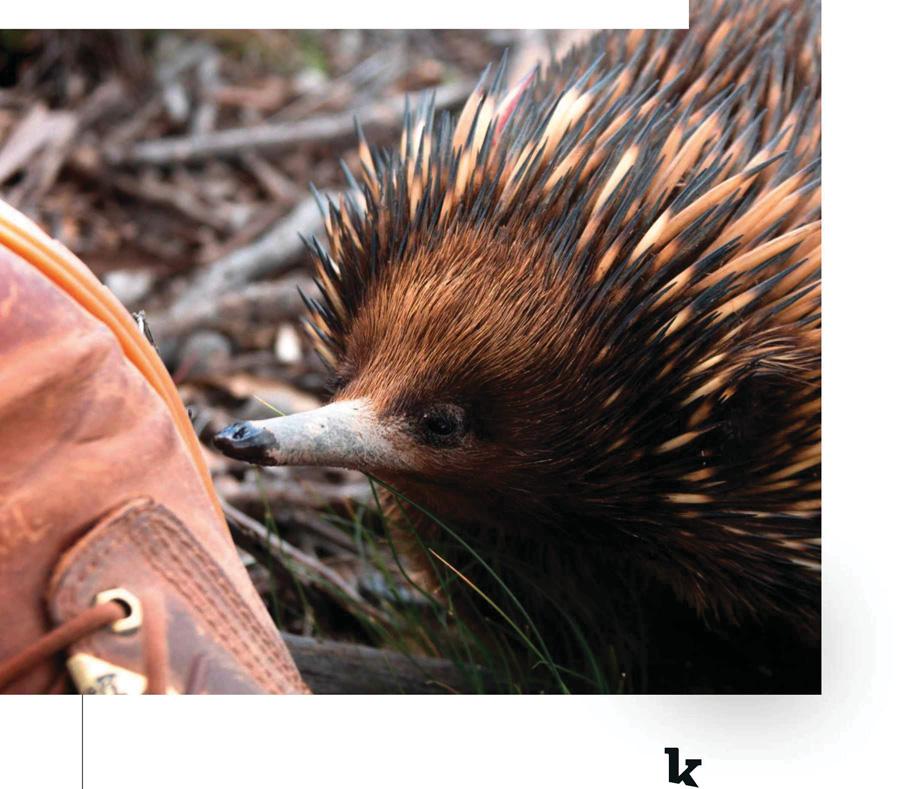"It sniffed at my hiking boot and tickled my bum with its snout"
BBC Wildlife
|August 2025
An echidna in Mulligans Flat

WHEN YOU'RE HIKING IN THE Australian bush, your eyes home in on every distant blob. Everything looks like an echidna. Or at least that's what you hope. Then you blink yourself back to reality, because it turns out to be a grassy tussock, a cowpat or a stump.
I'm an Aussie born and bred, but I've only seen a few of these spiny monotremes in my three-decade lifetime – and those sightings were fleeting. Occasionally they turned up unexpectedly on the farm where I grew up, sometimes I've had to slow down for them on the highway. Echidnas are iconic but they're notoriously elusive.
Even when you do come across one, an echidna usually offers a prickly reception. Tucking its legs and snout beneath its body, it enters what can only be described as 'spiky ball mode' in an effort to deter potential threats.
All things considered, I never imagined I'd have a nonchalant echidna almost land in my lap – but that is exactly what happened one spring day in 2020.
Cette histoire est tirée de l'édition August 2025 de BBC Wildlife.
Abonnez-vous à Magzter GOLD pour accéder à des milliers d'histoires premium sélectionnées et à plus de 9 000 magazines et journaux.
Déjà abonné ? Se connecter
PLUS D'HISTOIRES DE BBC Wildlife

BBC Wildlife
"I was terrified the elephant would ram us"
African elephant in Kenya
2 mins
January 2026

BBC Wildlife
ALL YOU EVER NEEDED TO KNOW ABOUT THE Fennec fox
THE FENNEC FOX IS THE SMALLEST fox in the world, with a body length that can be as little as 24cm.
3 mins
January 2026

BBC Wildlife
INTO THE PLASTISPHERE
A unique synthetic ecosystem is evolving in our oceans – welcome to the plastisphere
7 mins
January 2026

BBC Wildlife
“More than half of all animal life exists in a parasitic relationship, and all life lives in symbiosis”
Our survival depends on species evolving to live together - but some relationships take dark turns
7 mins
January 2026

BBC Wildlife
Are animals able to dream?
SLEEP IS A MYSTERIOUS THING. FOR A long time, we weren't sure why we do it.
1 mins
January 2026

BBC Wildlife
Does a cuckoo know it's a cuckoo?
ABSURD LITTLE BIRDS ACROSS THE world lay their eggs in the nests of other species, leaving the hapless parents to raise a changeling at the expense of their own offspring.
2 mins
January 2026

BBC Wildlife
Orcas killing young sharks
Juvenile great whites are easy prey for orca pod
1 mins
January 2026

BBC Wildlife
Ocean goes on tour
Acclaimed film touring the UK, backed by live orchestra and choir
1 min
January 2026

BBC Wildlife
Feisty bats hunt like lions
Winged mammals use a 'hang and wait' strategy to take down large prey
1 mins
January 2026

BBC Wildlife
SNAP-CHAT
Richard Birchett on magical merlins, wily coyotes and charging deer
2 mins
January 2026
Listen
Translate
Change font size

